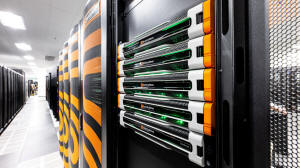|
Each of the systems has eight DataScale SN30 chips, launched in
September, and triples the speed of the previous generation.
With AI work taking center stage in research, Argonne National
Laboratory has been testing out various AI chips and systems,
Rick Stevens, associate lab director for computing, environment
and life sciences at Argonne lab told Reuters.
In addition to SambaNova, AI systems from startups including
Cerebras Systems, Groq Inc, Graphcore, and Intel Corp owned
Habana Labs have been tested.
"We're working with new emerging AI hardware architectures, and
we get early hardware and then we play with it, we use it on our
science applications," said Stevens.
"When we get to that point, we make internal decisions - 'Is
this useful enough and performant enough and interesting enough
that we should take the next step?' And so SambaNova has gotten
to that milestone."
Steven said the lab was evaluating AI hardware for its next
supercomputer to see if SambaNova and others can be included.
The lab, which is a Department of Energy national lab run by the
University of Chicago, is currently building a supercomputer
dubbed Aurora that will be a two exascale speed machine - able
to do two billion calculations in a second.
Stevens said the lab was in discussions with Cerebras and Habana
about scaling up those systems as well. "What we try to do is
understand the sweet spots of these different systems," he said.
SambaNova's first-generation AI system has been used to predict
how tumors respond to various drug combinations, improve weather
forecasting accuracy, and speed up fluid dynamics simulations,
he said.
(Reporting by Jane Lanhee Lee; Editing by Kenneth Maxwell)
[© 2022 Thomson Reuters. All rights
reserved.]
This material may not be published,
broadcast, rewritten or redistributed.
Thompson Reuters is solely responsible for this content.

|
|





